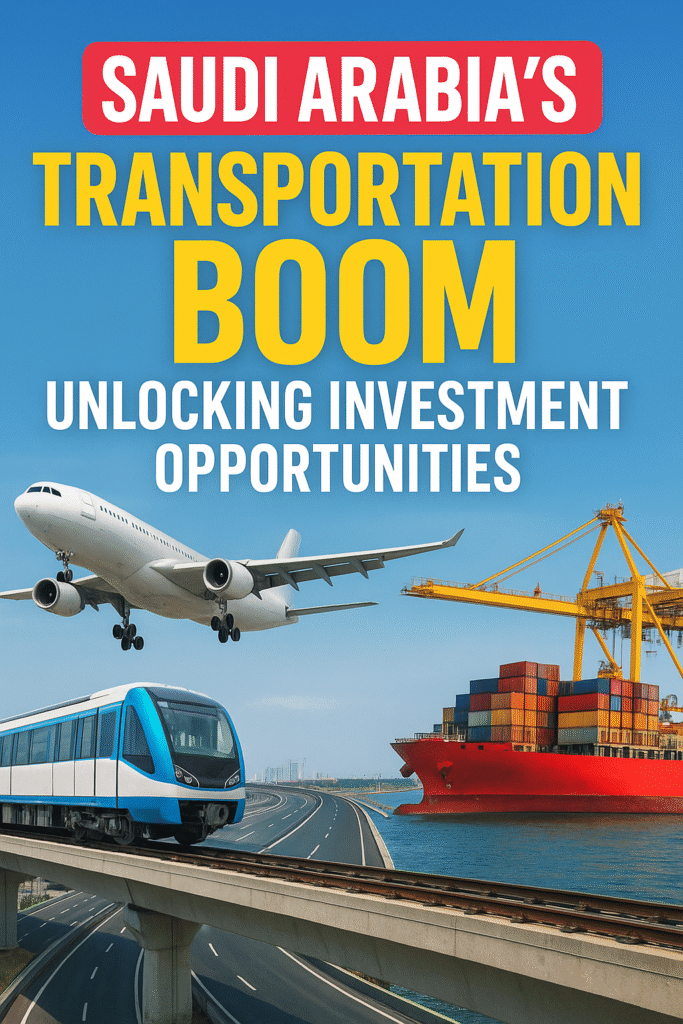Saudi Arabia is witnessing a broad metamorphosis of its transportation sector, turning it into one of the most dynamic machines of public growth. Anchored in the frame of Vision 2030, the Kingdom’s long- term development strategy, transportation is no longer viewed simply as a means of moving people and goods. rather, it’s being developed as a strategic enabler of profitable diversification, a attraction for private investment, and a central pillar in situating the Kingdom as a global logistics and business mecca. Assiduity experts, policymakers, and investors likewise agree that the transportation revolution unfolding in Saudi Arabia represents one of the most significant openings in the region moment. With new airfields, streamlined seaports, an expanding road network, and smart mobility systems afoot, the Kingdom is opening its doors to private players from across the world. Private Investment at the Core of Growth At the third PIF Private Sector Forum in Riyadh, Minister of Transport and Logistic Services Saleh Al- Jasser underlined the significance of private sector involvement in this metamorphosis. He revealed that private realities are anticipated to contribute nearly 80 percent of all targeted investments in transport and logistics. In figures, this translates to systems worth over SR240 billion($ 63.95 billion) being made available for private participation through public-private hookups( PPPs) and privatization enterprise. From aeronautics outstations to harborage installations and rail systems, the government is offering a different range of openings for both original and transnational enterprises. According to Joseph Salem, mate at Arthur D. Little Middle East, “ Privatization of crucial structure, similar as anchorages and airfields, is n’t only attracting private capital but also bringing in effectiveness and moxie. These reforms are helping the Kingdom produce a more competitive transport ecosystem aligned with its Vision 2030 pretensions. ” erecting a Logistics hustler The rapid-fire expansion of transport installations is tightly linked to Saudi Arabia’s ambition of getting a leading logistics mecca connecting three mainlands — Asia, Europe, and Africa. Recent data from the General Authority for Statistics showed that the number of logistics installations in the Kingdom has grown by 267 percent since 2021, with the Eastern Province leading in large- scale logistics capitals covering further than 6 million square measures. Private companies are decreasingly active across the force chain Road Transport and Trucking Fleet drivers and logistics startups are meeting rising demand for goods transport. Warehousing and Distribution The smash ine-commerce has created massive demand for ultramodern storehouse and last- afar delivery results. Technology Integration Startups specializing in AI, digital freight platforms, and independent vehicles are entering the request, adding invention to traditional logistics. By 2030, Saudi Arabia aims to reduce logistics costs, ameliorate delivery trustability, and grow the logistics sector to$ 57 billion, forcefully establishing its part as a gateway for global trade. Transformative Megaprojects Saudi Arabia’s transport revolution is being driven by megaprojects that gesture a new period of connectivity. Riyadh Metro With six lines covering 176 kilometers, it’s designed to transfigure public transport in the capital and ease civic traffic. road Expansion The Kingdom plans to extend its rail network from 3,650 km to 8,000 km, perfecting links between artificial centers, metropolises, and anchorages. Seaport Modernization Saudi anchorages are being upgraded to handle up to 40 million TEUs by 2030, supported by robotization and private hookups. Air Cargo Growth The country’s weight capacity is set to exceed 4.5 million tonnes annually, placing Saudi Arabia among the leading global air freight capitals. NEOM’s Smart Mobility Network As part of the futuristic NEOM design, independent vehicles, drones, and AI- powered systems are being tested to review mobility. These enterprise showcase Saudi Arabia’s long- term commitment to creating a world- class transport ecosystem. Technology and Sustainability A crucial motorist of Saudi Arabia’s new transport strategy is technology- enabled sustainability. The Kingdom is heavily investing in smart structure and clean mobility. Electric Vehicles( EVs) Saudi Arabia has blazoned a plan to exhilarate 30 percent of vehicles in Riyadh by 2030, supported by the rollout of thousands of EV charging stations across the Kingdom. Smart metropolises systems like NEOM are integrating IoT detectors, AI- driven business systems, and prophetic traffic tools to optimize civic mobility. Digital Logistics robotization, AI, and blockchain are streamlining freight operations, making force chains briskly, more dependable, and further cost-effective. Sustainable Mobility Public transport systems like the Riyadh Metro aim to cut emigrations, reduce traffic, and promoteeco-friendly commuting. These enterprise punctuate the Kingdom’s intention not only to contemporize but also to produce a sustainable and unborn-ready transport system. Driving Broader profitable Growth Transportation is further than a standalone sector; it’s the backbone of Saudi Arabia’s wider profitable intentions. Tourism bettered access to destinations like Qiddiya, Amaala, and the holy metropolises of Makkah and Madinah supports the Kingdom’s thing of drinking millions of excursionists and pilgrims annually. Trade and Investment Reduced logistics costs and briskly delivery times make Saudi Arabia a more seductive destination for foreign direct investment( FDI). Real Estate and Retail Better connectivity is fueling demand for new casing, marketable developments, and retail spaces across the country. Artificial Growth Effective force chains support sectors like construction, manufacturing, and husbandry, icing goods reach requests briskly. According to Anthoine Barthes, vice chairman of Al- Futtaim Automotive, “ Transportation links are the lifelines that connect profitable zones, attract investment, and ameliorate quality of life for residers and callers likewise. ” Addressing Challenges While the openings are vast, Saudi Arabia is also addressing challenges that come with such an ambitious metamorphosis. Dependence on Roads Heavy reliance on trucking is being balanced with rail expansion and public conveyance investment. Geographic Scale Serving a vast home requires extending transport networks to remote regions. Regulatory Hurdles Reforms, similar as the establishment of the National Center for Privatization, are streamlining investment blessings. Chops dearths Knowledge transfer through global hookups is helping make a professed original pool. Climate and Sustainability structure is being designed to repel harsh environmental conditions and reduce carbon vestiges. As Alessandro Tricamo of Oliver Wyman notes, the success of these systems depends on “ clear fabrics, careful asset selection, and balanced support between government and investors.The Road Ahead Toward 2030 and Beyond By 2030, Saudi Arabia envisions itself as a global leader in transport and logistics, backed by 40 new logistics centers across 100 million sq. measures. A logistics sector valued at$ 57 billion. Expandedmulti-modal freight systems connecting land, air, and ocean. Integrated digital and green mobility results supporting sustainable growth. The Kingdom’s dramatic rise in the World Bank Logistics Performance Index — climbing 17 places to 38th in 2023 — is just one index of the rapid-fire progress formerly made. For private investors, the openings are immense. From construction and engineering to technology and force chain results, Saudi Arabia’s transport sector offers a vast diapason of profitable gambles. More importantly, these investments align with a public vision that’s reshaping not just Saudi Arabia, but the entire indigenous profitable geography. Conclusion Saudi Arabia’s transportation smash is further than a domestic structure drive; it’s a strategic metamorphosis with global counteraccusations . By prioritizing public-private hookups, digital invention, and logistics excellence, the Kingdom is laying the foundation for sustained profitable growth and diversification. As Vision 2030 continues to unfold, the transport sector will serve as both a backbone of public progress and a gateway for transnational investors. With bold intentions, massive investments, and clear government commitment, Saudi Arabia is situating itself as one of the world’s most dynamic capitals for mobility, trade, and business.



0 Comments